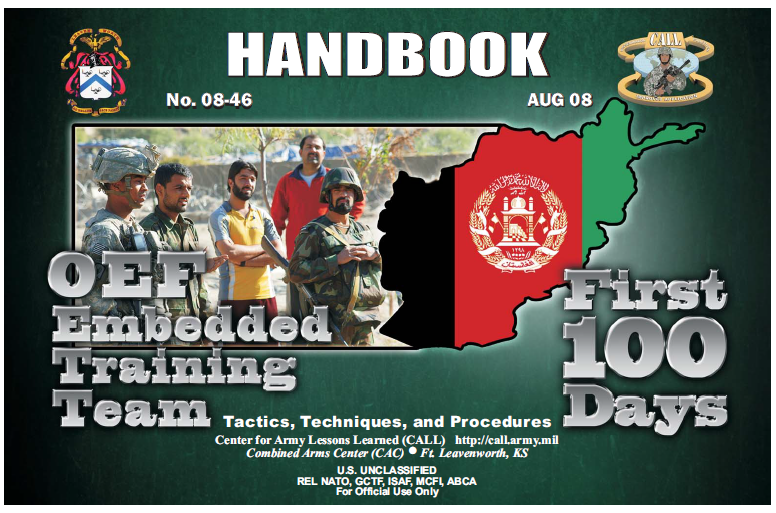FIRST 100 DAYS OEF ETT HANDBOOK
- 84 pages
- For Official Use Only
- August 2008
This handbook is written for you, the embedded training team (ETT) member. Traditionally, this mission was reserved for Special Forces’ units or teams. With the revision of Army Field Manual 3.0, Operations, this is now a mission for general purpose forces. The Army has not yet officially designated one organization or agency as the ETT proponent; therefore, information concerning TTs circulates at all levels. This handbook has been vetted by the Joint Center for International Security Forces Assistance, 1st Infantry Division, Combined Security Transition Command-Afghanistan, and the Center for Army Lessons Learned Integration Network.
There are two key facts ETT members must consider:
• Your first 100 days in theater will set the tone for the rest of your tour.
• You will not have much time for professional reading while at the predeployment site. So, if you only read one handbook, we think it should be this one.The subjects in this handbook are a compilation of the most important topics raised by your predecessors during in theater interviews and redeployment surveys.
…
Advising and Mentoring
As an embedded training team (ETT) member, you can count on playing the roles of advisor and mentor. Some of you may also be trainers.
Definitions:
• Military advisor: Soldier sent to foreign nations to aid that nation with its military training, organization, and other military tasks.
• Mentor: A trusted friend, counselor, or teacher; usually a more experienced person.Doctrinally, ETT members conduct an advisory mission; however, within Afghanistan, the use of the term mentor is more readily used by the Afghan National Security Forces (ANSF) (e.g., Afghan National Army [ANA], Afghan National Police [ANP], etc.). An effective advisor performs not only the advisory role, but will be a mentor to his counterpart.
Mentor basics
The ANSF unit has much to gain from coalition advisors:
• Coalition funding and equipment (lethal and nonlethal)
• Coalition intelligence
• Coalition effects (lethal and nonlethal)
• Coalition training
• Operational and tactical adviceA great advisor can:
• See solutions to seemingly unsolvable problems.
• Work from the commander’s intent and guidance.
• Orchestrate events to ensure success from behind the scenes (focus on the mission versus seeking personal credit).A great advisor must:
• Be part diplomat and part warrior.
• Stay aware of local power struggles and how they will affect his organization.
• Attempt to influence ANSF according to long-term interests rather than short-term gains.A mediocre advisor:
• Does not understand the dynamics of rapport, credibility, and value.
• Is often reduced to liaison roles with counterparts, while liaison officers who understand these dynamics often achieve status similar to advisors or confidantes with counterparts.Key Skill Areas for Mentoring
The ANA are skillful in:
• Dismounted patrolling
• Combined arms
• Branch-specific skillsThe ANP are skillful in:
• Community-oriented policing
• Problem-oriented policing
• Evidence procedures
• ArrestsThe Afghan Border Police (ABP) are skillful in:
• Search
• Border rules
• Border checkpointsEveryone should be skillful in:
• Ethical training
• Combat lifesaver
• Targeting
• Communications
• Intelligence preparation of the battlefield
• Human intelligence
• Planning
• Orders
• Leadership
• De-escalation of force
• Systems
• Civil-military operationsMissions of an ANA Advisor/PMT
Primary missions
Mentor ANA in:
• Leadership, staff, and support functions.
• Planning, assessing, supporting, and executing operations and training.
• Doctrine, tactics, techniques, and procedures.Provide ANA access to combat enablers such as:
• Close air support/fires.
• Medical evacuation.
• Quick reaction force (QRF).
• Redundant command and control capability.Sustain ANA units:
• Monitor ANA pay operations and personnel
• Contract or cash purchase ANA support/sustainment
• Assist ANA forces in forecasting requirements
• Assist ANA forces in planning, developing, and executing sustainmentOther ANA support missions
School house and doctrine (Training and Doctrine Command):
• Develop and execute institutional training programs.
• Synchronize Soldier, noncommissioned officer (NCO), and officer course programs of instruction.
• Update and translate doctrinal and training publications.Logistical support (logistics task force): Maintain and sustain ANA forces (ANA depot-level support).
Partnership program: Participants with Combined Joint Task Force-101, Combined Joint Special Operations Task Force, and International Security Assistance Force.
Police mentor team missions
Afghan Uniformed Police PMT:
• Assist and mentor the provincial Community of Police (CoP) in operating, manning, and equipping the Joint Police Command Center.
• Mentor, coordinate, monitor, and support the assigned provincial CoP efforts to conduct authorized Afghan National Auxiliary Police training, sustainment training, and opportunity training.
• Establish close coordination with the provincial reconstruction team/police technical assistance team within your area of responsibility.Afghan Border Police PMT missions:
• Mentor ABP element in participating in the Joint Regional Command Center (JRCC) process for that headquarters (HQ).
• Mentor, coordinate, monitor, and support the assigned battalion or brigade commander efforts to conduct sustainment training and opportunity training.Afghan National Civil Order Police (ANCOP) PMT missions:
• Mentor ANCOP element in participating in the JRCC process for that HQ.
• Provide coordination support to the ANCOP element during cross-boundary/QRF operations.Other missions for advisor/mentors:
• Presence patrol (day and night)
• Village assessment
• Humanitarian aid
• Traffic checkpoint
• Eradication of suspected or known enemy positions
• Drug eradication
• Cordon and search for weapon cache
• High value target force protection and security escort
• Route/area security
• Joint operation
• Route/area reconnaissance
• Threat investigation

